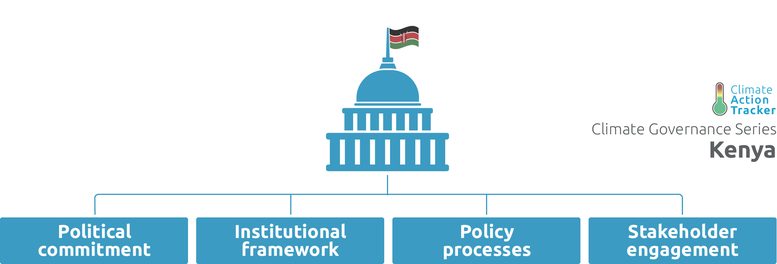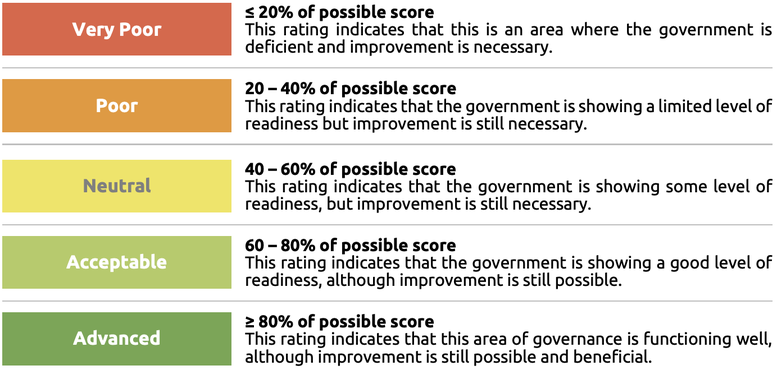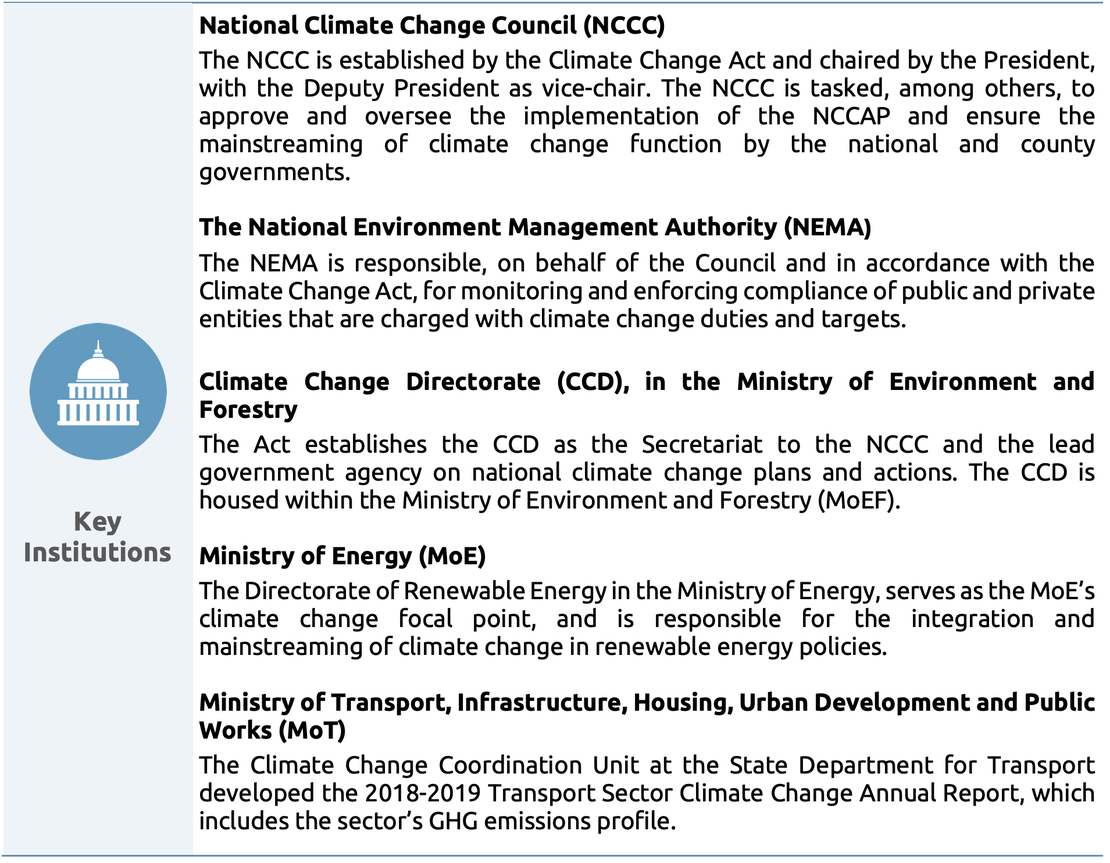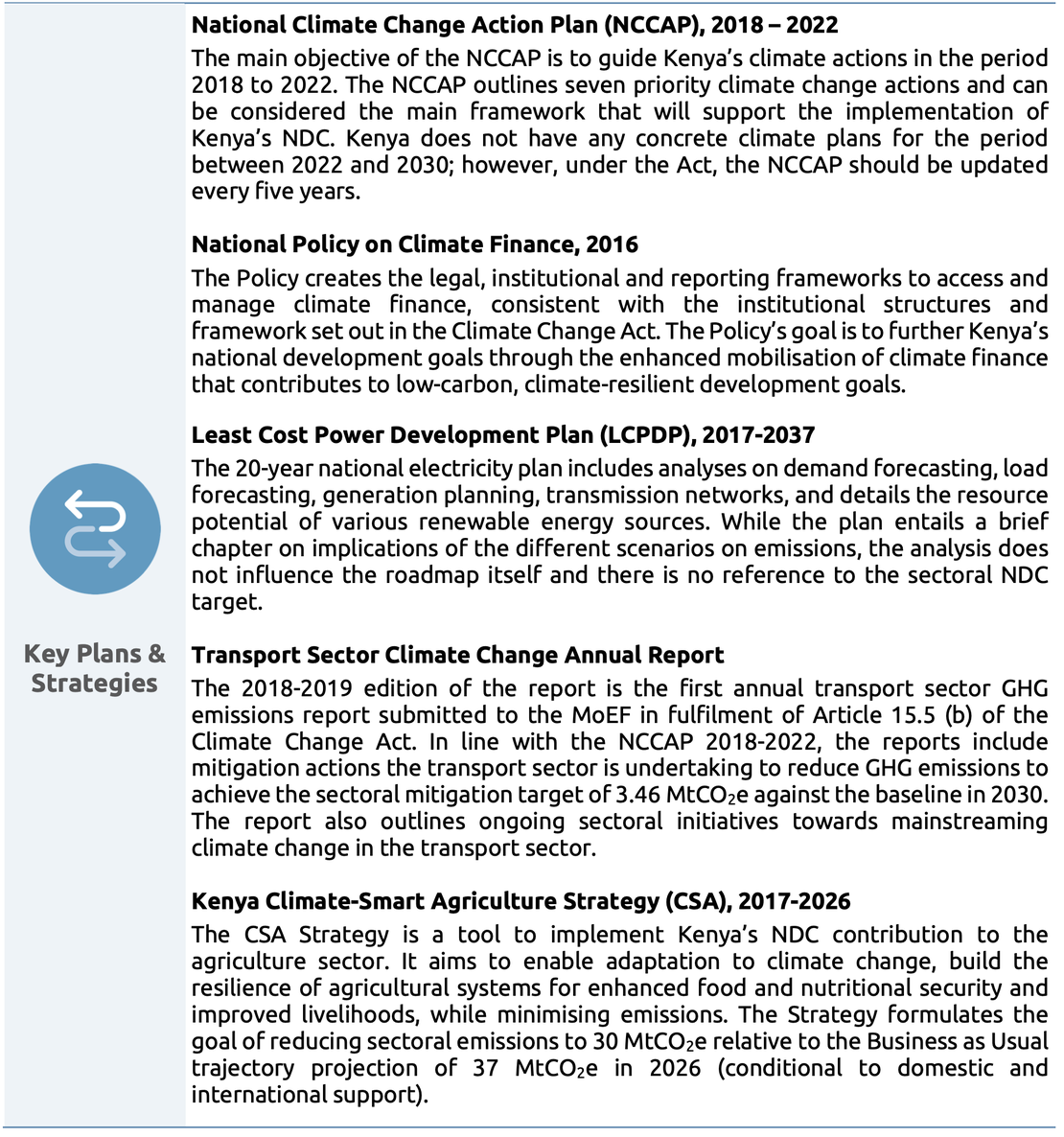Climate Governance in Kenya
Attachments

The CAT Climate Governance series seeks to produce a practical framework for assessing a government’s readiness – both from an institutional and governance point of view – to ratchet up climate policy and implement adequate transformational policies on the ground, to enable the required economy-wide transformation towards a zero emissions society.

Our methodology
We have set up a framework that assesses and scores a number of indicators, where we rate various aspects of governance. This allows us to establish a common basis on which to compare climate governance across countries as well as identify areas of improvement and highlight positive developments. We have applied this framework at a national level.
For the purpose and overview of this series, see our Climate Governance series main page. The methodology framework used for this assessment is here. For more detail on our methodology, see here: methodology page.
Assessment of national level readiness
Kenya’s political commitment to climate change mitigation issues is evident - the President and line ministries support climate mitigation action. However, leadership from the head of state and leading institutions could take a more proactive stance on scaling up climate action domestically and drive the transition to a zero emissions economy and society. Greater autonomy and power for the Climate Change Directorate would further advance the development and implementation of climate mitigation policies aimed at Kenya’s zero emissions transition.
The institutional framework of Kenya is clearly defined and enshrined in law, but the coordination between ministries, and between national and county levels is not yet effective. As a result, climate change and the fulfilment of national climate change mitigation targets are not consistently included in all sectoral plans. While the national climate change lead agency has qualified staff, its budget is insufficient to enable effective implementation of some statutory tasks, such as the analytical support to sector ministries, which could be improved.
Evidence suggests that efforts are underway to establish processes for climate policy development, implementation and review. However, Kenya does not yet have long-term emissions reduction strategies and targets. While the contours of a comprehensive transparency framework in line with the country’s climate law are in place, these are not yet widely applied across sectors. It is therefore difficult to assess the effectiveness of policy measures being implemented and whether the sectors’ contours are on track to meet their targets. Whether domestic climate action becomes progressively more ambitious will be seen once the country has published its revised NDC, which is currently under development.
The Kenyan Government has shown a moderate approach to stakeholder engagement. While policy documents acknowledge the importance of public awareness and the government regularly involves stakeholders in planning processes, there is scope to improve public participation and access to information. In particular, actors who would profit from the transition to a zero emissions society and those who live in marginalised areas have limited influence on decision-making processes.
There have been no substantial developments in Kenyan climate governance since the publication of the National Climate Change Action Plan (NCCAP) 2018-2022, which was included in the CAT’s last assessment for Kenya. The government is still in the process of implementing the climate governance structures set out in the 2016 Climate Change Act. Further, the Kenyan Government plans to publish its updated NDC in the coming months, and has initiated the process of developing the country’s "2050 Long-Term Greenhouse Gas Strategy and Carbon Resilience Development Pathway under the Paris Agreement". The updated NDC and the Long-Term Strategy (LTS) will reveal whether the structural and institutional measures that have been established will result in adequate climate mitigation action. Similar to Kenya's 2030 Vision and the President's Big Four agenda, climate change or transition-related aspects are also not a priority in the country's economic stimulus program, which is intended to support vulnerable citizens and companies affected by COVID-19.1
1 The analysis for this report was completed in October 2020.
Rating system

We analyse a number of different criteria of governance under four categories that cover the key enabling factors for effective climate action. We give each a rating as outlined above (very poor - poor - neutral - acceptable - advanced). The methodology framework used for this assessment is here. For more detail on our methodology in general, click the link below.
Ratings and Recommendations
The following section outlines the results of the analysis for each of the different categories and criteria as well as our recommendations for each category of governance.

- Strengthen the political commitment on climate mitigation – and the transition to a zero emissions society – at the highest government levels.
- Prioritise climate issues in the national development agenda and other policy plans.
- Strengthen the Climate Change Directorate’s mandate to drive the necessary policy and regulatory developments for the transition.

- Improve coordination between the national government and county governments, as well as between line ministries.
- Ensure that all line ministries align their policies with the country’s NDC target and consider the transition to a zero emissions economy and society in their policies.
- Ensure the Climate Change Directorate has sufficient resources to adequately implement its statutory tasks as mandated by the Climate Change Act, such as the provision of analytical support to the various line ministries.

- Set a long-term 1.5˚C-compatible emissions reduction target and develop plans to achieve this target.
- The Climate Change Act needs to be strengthened by including a Paris aligned emissions reductions target.
- The Energy Act needs to include a sectoral emissions reductions target that is aligned with the Paris Agreement with a plan to decarbonise the energy mix.
- Ensure that all sectors implement an MRV framework as required under the Climate Change Act to track and report on progress on climate action.

- Ensure that the existing channels for the participation of the Kenyan public in the decision-making process are being used effectively so that governmental decisions reflect the different opinions.
- Improve the stakeholder consultation process to enable non-state actors from marginalised areas to participate in decision-making processes.
Kenya's Climate Governance
These tables from the report give an overview and analysis of the key factors of Kenya's governance to enable effective climate action. We look at the country's key institutions, strategies, targets and legislation.




Our 2019 assessment of Kenya's climate governance is available here.
Stay informed
Subscribe to our newsletter